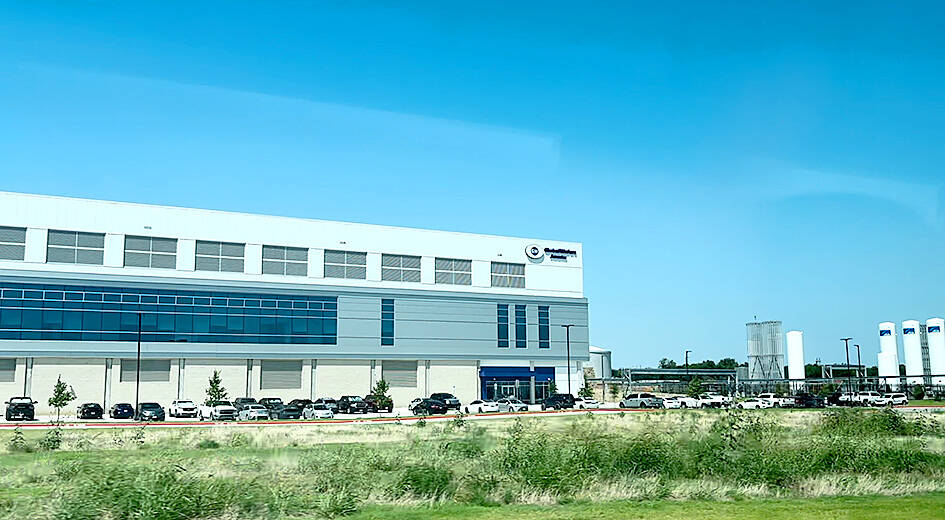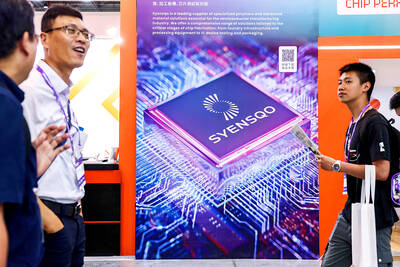Texas is emerging as a key hub for global technology and manufacturing, attracting major Taiwanese companies, but rising wages and living costs are creating steep hurdles for investors, local businesses told CNA recently.
With US President Donald Trump’s “Made in America” agenda and high tariffs on imports, more firms are choosing Texas as a US base, insiders said.
Chen Shih-hsiu (陳世修), head of the Taiwanese Chambers of Commerce in North America, said that most Taiwanese firms are clustered in Houston and Dallas. Major investments include GlobalWafers Co (環球晶圓), Delta Electronics Inc (台達電子) and Sysgration Ltd (系統電子).

Photo: CNA
Dallas is particularly attractive, Chen said, because of its diverse industries, strong supply chains, and location at the center of North America.
Free trade under the US-Mexico-Canada Agreement (USMCA) also adds to its appeal, he said.
Texas data shows Taiwanese firms have announced 15 projects in the state over the past decade, totaling nearly US$11.2 billion and creating 3,550 jobs.
Electronics giants such as Hon Hai Precision Industry Co (鴻海精密), Compal Electronics Inc (仁寶電子), Quanta Computer Inc (廣達電腦), Wistron Corp (緯創) and Pegatron Corp (和碩) have already set up operations in Texas, Chen said, adding that suppliers of screws and plastics are also considering entry, drawn by cheap land, strong transport links, and no state income tax.
Beyond manufacturing, Texas is gaining ground in artificial intelligence (AI) and space technology. For example, Phison Electronics Corp (群聯電子) is working with local partners to develop the world’s first data center in space.
Houston is a hub for space industries, and storing sensitive data in orbit avoids geopolitical risks, Phison Technology Inc (USA) president Michael Wu (吳宗誠) said, calling it a rare chance for Taiwanese firms to join America’s cutting-edge technology industry development.
With Tesla Inc, Advanced Micro Devices Inc, HP Inc and Dell Technologies Inc already in Texas, Wu said the state is becoming a tech magnet despite uncertainty over US tariff policy.
Still, costs are rising quickly. Texas accounts for 36 percent of US semiconductor manufacturing, but rapid growth has pushed up wages, housing prices and property taxes.
“Salaries here are now close to California levels,” Teco Electric & Machinery Co (東元電機) green mechatronic solution business group president Wang Jung-bang (王榮邦) said.
Taiwanese companies aiming to establish a US presence must adapt, said Intelligent Epitaxy Technology Inc (英特磊) chairman Kao Yung-chung (高永中), as investing in the US will always be more costly and take longer than in Taiwan.
“Taiwanese firms need to treat their US operations as American companies, not just extensions of Taiwan,” and it is unrealistic if companies expect to bring all their personnel from Taiwan, he added.

SEMICONDUCTOR SERVICES: A company executive said that Taiwanese firms must think about how to participate in global supply chains and lift their competitiveness Taiwan Semiconductor Manufacturing Co (TSMC, 台積電) yesterday said it expects to launch its first multifunctional service center in Pingtung County in the middle of 2027, in a bid to foster a resilient high-tech facility construction ecosystem. TSMC broached the idea of creating a center two or three years ago when it started building new manufacturing capacity in the US and Japan, the company said. The center, dubbed an “ecosystem park,” would assist local manufacturing facility construction partners to upgrade their capabilities and secure more deals from other global chipmakers such as Intel Corp, Micron Technology Inc and Infineon Technologies AG, TSMC said. It

EXPORT GROWTH: The AI boom has shortened chip cycles to just one year, putting pressure on chipmakers to accelerate development and expand packaging capacity Developing a localized supply chain for advanced packaging equipment is critical for keeping pace with customers’ increasingly shrinking time-to-market cycles for new artificial intelligence (AI) chips, Taiwan Semiconductor Manufacturing Co (TSMC, 台積電) said yesterday. Spurred on by the AI revolution, customers are accelerating product upgrades to nearly every year, compared with the two to three-year development cadence in the past, TSMC vice president of advanced packaging technology and service Jun He (何軍) said at a 3D IC Global Summit organized by SEMI in Taipei. These shortened cycles put heavy pressure on chipmakers, as the entire process — from chip design to mass

People walk past advertising for a Syensqo chip at the Semicon Taiwan exhibition in Taipei yesterday.

NO BREAKTHROUGH? More substantial ‘deliverables,’ such as tariff reductions, would likely be saved for a meeting between Trump and Xi later this year, a trade expert said China launched two probes targeting the US semiconductor sector on Saturday ahead of talks between the two nations in Spain this week on trade, national security and the ownership of social media platform TikTok. China’s Ministry of Commerce announced an anti-dumping investigation into certain analog integrated circuits (ICs) imported from the US. The investigation is to target some commodity interface ICs and gate driver ICs, which are commonly made by US companies such as Texas Instruments Inc and ON Semiconductor Corp. The ministry also announced an anti-discrimination probe into US measures against China’s chip sector. US measures such as export curbs and tariffs